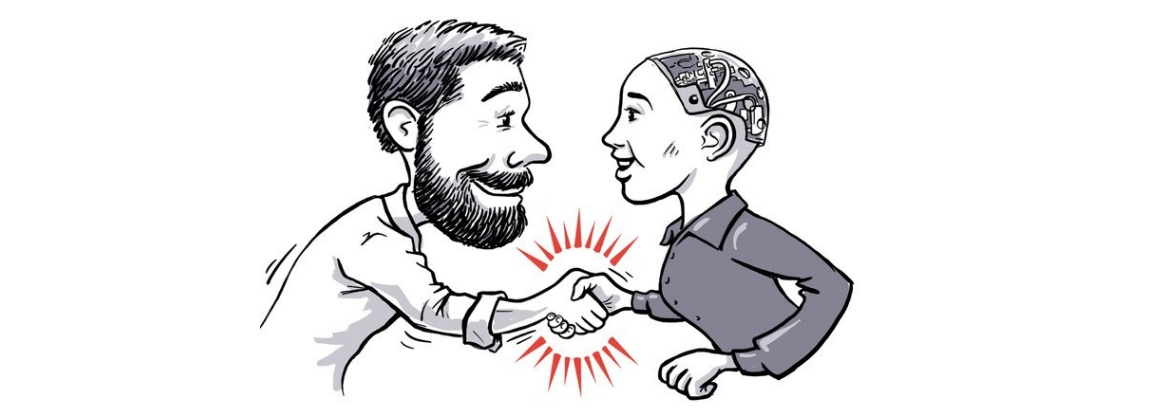Last week I was humbled to share the stage at a conference on Artificial Intelligence (A.I.) alongside both Sir Tim Berners Lee, the man who gave us the web, and Sophia, the artificial intelligence robot designed by David Hanson.
As Sophia was about to commence her talk, the sense of anticipation and excitement among the audience was absolutely electric… palpable even, as people were vying for selfies and close up views of her. However, as Sophia was finishing her talk, the atmosphere had changed quite dramatically for much of the audience from one of hope and curiosity for our future, to an unnerving sense of uncertainty and dare I say it, fear.
Sophia is almost too real, and what she represents can be unnerving to some. Indeed, a recent study conducted by Oxford and Yale Universities suggests that within 30 years robots will be better translators, essay writers and surgeons than humans. Stephen Hawking, Elon Musk and Bill Gates have all expressed some level of concern about the rush toward singularity, the point at which artificial intelligence far outweighs our own intelligence and will be able to exponentially advance their own capabilities without the need of human assistance.
While some may take a pessimistic view of our future, I have no doubt that many of the advances gained through the use of Artificial Intelligence will invariably lead to many incredible game changing disruptions to traditional industries. For example, how will A.I. impact the events industry? We only have to look at the opening of the Winter Olympics in Korea earlier this year to see that Drones will make the Fireworks industry either obsolete or a “nostalgic” premium within less than a decade. Take Disney Parks around the world and the sheer amount of money spent on fireworks every night only to be exploded in one split second. But with drone technology, those “A.I. fireworks” can be used, over and over again, the choreography will be much more seamless, no more environmental air pollution, no noise pollution, I can have indoor fireworks and I can customise the “fireworks” to any shape or message I choose!
All that said, I firmly believe there are still some core human traits that that A.I. will not be able to replicate any time soon. As such, these traits will become even more important skill sets in the decades ahead. These are in fact the gifts we are all born with and that make us distinctly human… creativity, imagination, emotional intelligence, and curiosity.
My three decades at Disney (most recently as head of innovation and creativity) taught me the importance of these four traits in abundance. Whether it’s the emotional intelligence of the storytellers at Pixar, whose tales about toys, robots and fish unearth deep human insights that tap into our very souls; the creativity embraced by songwriters like the Sherman Bros and Lopez’s that gave us both SuperCaliFragiListicExpialidocious and Let it Go! or the imaginations of the Disney Imagineers who immerse us in a world of fantasy, it remains true that human imagination, creativity, emotional intelligence, and curiosity are always at the forefront of innovation.
Organisations that understand the power of these so-called soft skills that only humans can deliver will far surpass their competition and are most likely to not only survive, but thrive in the most disruptive decade of transformation in recent history.
Compounding the challenges presented by innovation in artificial intelligence is a massive cultural mindset shift that has already been put into motion, largely by Millennials, and is set to become the norm with Generation Z. This mindset dictates that a company’s purpose will matter more than profit, not only for decisions surrounding purchases, but also in terms of where these generations are willing to invest their work.
In order to compete in this brave new world, traditional models of product centric cultures will be quickly overturned by people centric ones, focused on the needs of not only their consumer but also their employees. Accessing the human potential for innovation and creativity becomes not only a game changer for business, but also a life saver for companies.
While I have no doubt that Sophia and her more advanced prototypes of the future will be able to paint modern masterpieces and compose songs that rival the greatest composers, they will never be able to reach into our hearts as only our fellow humans can. Human imagination, curiosity, emotional intelligence and creativity will only become more valuable as the ranks of robots swell. Faced with the rising tide of automation, I would continue to bet on our combined imagination!
To paraphrase Picasso “We are all born creative, the challenge is learning how to remain creative as we grow up”. With the advances in A.I. that are on the way, successfully tackling this particular challenge is more important than ever before.
Duncan Wardle will be presenting at IBTM World in Barcelona on the 28th November. Register to attend at www.ibtmworld.com

